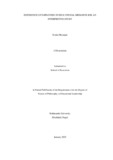
Please use this identifier to cite or link to this item:
https://hdl.handle.net/20.500.14301/508| Title: | Experience of Employees in Educational Mismatch Job: An Interpretive Study. |
| Authors: | Maharjan, Sunita |
| Citation: | Maharjan, S. (2025).Experience of employees in educational mismatch job: An interpretive study. |
| Issue Date: | Jan-2025 |
| Publisher: | Kathmandu University School of Education |
| School: | SOED |
| Department: | DOEL |
| Level: | M.Phil. |
| Program: | MPhil in Educational Leadership |
| Abstract: | The purpose of this study is to explore the reasons for educational mismatches in the job, how they affect people’s careers and lives, and what can be done to the challenges employees face in the mismatched job. Using an interactive method, I have collected personal experiences from participants who were working in fields different from what they have as an academic degree. This sharing helped not to discover not just the reasons behind the mismatches but also the emotional and practical impact on the individuals involved. Sharing of participants highlights various reasons for being in their current jobs which is different from what they had imagined when choosing their education path. A few reasons to be highlighted are financial needs, family responsibilities, or the unavailability of jobs in their area of study. Another reason showing concern is not getting proper guidance during their education and didn’t know how to plan their careers. They mentioned that they felt pressure from family, friends and financial expectations when making career choices. As a result, they ended up choosing courses that did not truly match their interests or abilities. Some have realized their field had very limited job openings or required additional qualifications or licenses, which were hard to get. It also highlighted the emotional struggles faced by the participants. Many expressed disappointment, frustration, or lack of motivation in their initial days of their current jobs. They have accepted their situation and focused on making the best of their current jobs. Still, most agreed that with organizational support, self-effort and better career guidance and more realistic expectations during their education, they might have taken different paths. It identifies key circumstances contributing to educational-job mismatches, such as weak linkages between educational institutions and industries, and the absence of practical training. It also shows how some participants were able to transfer skills from their education into unrelated jobs, though not always fully. Education and Industry collaboration has been an integral part of career development, as it facilitates the mechanisms to make graduates more familiar with the real workplace. Based on the findings, the study suggests that schools, colleges, and universities should offer better career counseling, expose students to real work environments in early stage, and help them understand job market trends. It also recommends that educational institutions build stronger partnerships with employers to create internships, apprenticeships, and job placements that reflect real-world needs. As career development gains importance in today’s work environment, organizations are increasingly prioritizing for facilitating growth of the employees. However, merely designing and offering training programs is not sufficient; the effectiveness of these initiatives heavily depends on the learner’s attitude toward growth and continuous learning. Structured interventions—such as on-the-job training, mentoring, and experiential learning—emerge as powerful tools to enhance adaptability and performance among mismatched employees. Both formal and informal learning avenues contribute to skill acquisition and motivation. In conclusion, this research highlights a real and growing problem in today’s job market. By listening to the voices of people who have lived through educational job mismatches, the study provides valuable insights and realistic suggestions. It encourages educators, employers, and policymakers to rethink how we prepare students for the future and stresses the need for more coordinated efforts to align education with employment opportunities. |
| URI: | https://hdl.handle.net/20.500.14301/508 |
| Appears in Collections: | Dissertation |
Files in This Item:
| File | Description | Size | Format | |
|---|---|---|---|---|
| Sunita Maharjan - 16th May 2025_Signed.pdf | 1.63 MB | Adobe PDF |  View/Open |
Items in DSpace are protected by copyright, with all rights reserved, unless otherwise indicated.